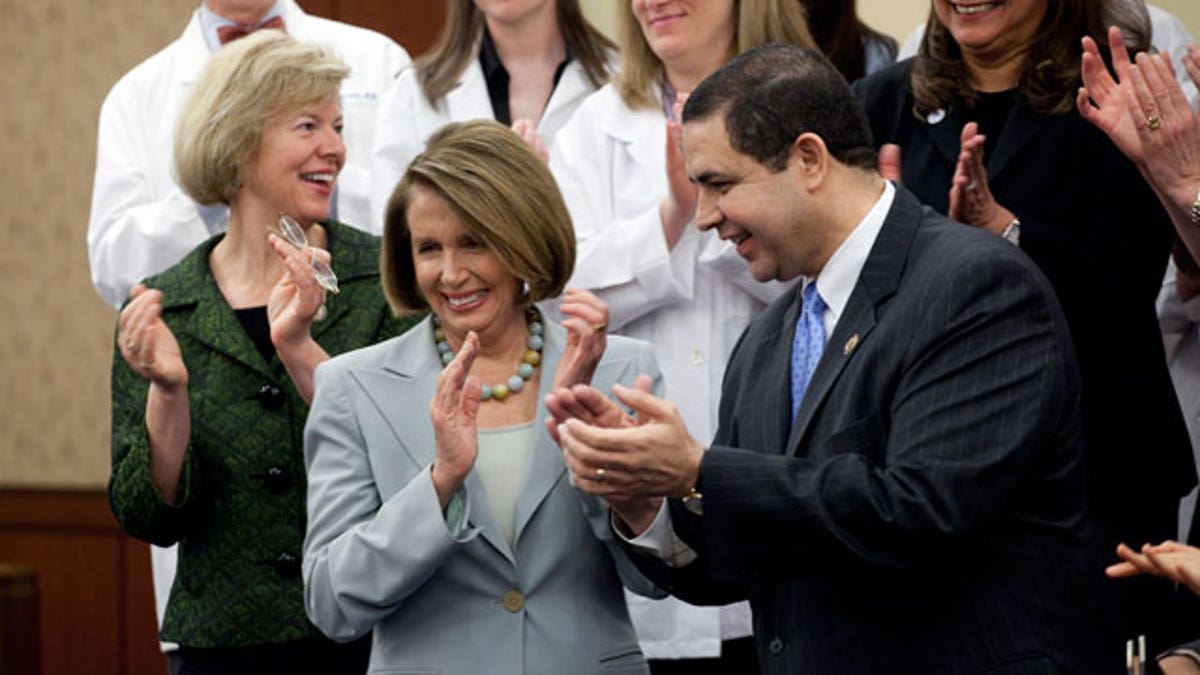
Rep. Tammy Baldwin, D-Wisc., Democratic Minority Leader, Nancy Pelosi, D-Calif., and Rep. Henry Cuellar, D-Tex., at a ceremony marking the one year anniversary of the passage of the Health Care Act on Capitol Hill in Washington on Thursday, March 17, 2011. (AP)
President Obama's health care overhaul turned one Wednesday, but the balloons and candles to mark the occasion were strictly limited to Democratic circles as polls show a nation still splintered over the law and recent reports question its cost-effectiveness.
Obama signed the overhaul in a lavish ceremony in the East Room of the White House last March 23 in front of nearly 300 people, including 200 Democratic lawmakers. One year later, he was en route back home from a five-day voyage in South America, facing a crisis in Libya.
But that doesn't mean the Obama political engine wasn't in action. First lady Michelle Obama, who accompanied the president on his trip, sang the law's praises in an opinion article published by Yahoo while Senate Majority Leader Harry Reid, House Democratic Leader Nancy Pelosi and an array of other Democrats hosted events and press conferences marking the anniversary.
Obama's campaign arm, Organizing for America, which has since been assimilated into the Democratic National Committee, arranged more than 100 events this week to laud the legislation while Health and Human Services Department officials, including Secretary Kathleen Sebelius, fanned out to town hall and advocacy group events.
At the same time, House Speaker John Boehner and Republican Senate leader Mitch McConnell slammed the law in an opinion article published in the Cincinnati Enquirer, and Republicans spent the day tweeting their intentions to return to the repeal mantle.
Despite all the activity, the public appears unfazed and entrenched.
Results from the monthly Kaiser Health Tracking Poll released Friday showed that 46 percent of Americans oppose the law compared with 42 percent who supported it. Shortly after the law passed last year, 46 percent favored it compared with 40 percent who didn't.
Rasmussen polling also consistently shows that since the law's passage a majority of Americans support repealing it. The latest release Monday found 53 percent in favor of overturning it. That's down 9 points, but the number of voters who favor repealing the law has never gone below 50 percent and has been as high as 63 percent, Rasmussen said.
"In one year's time, Democrats have managed to destroy every promise they made to the American people about health care reform," said Rep. Paul Broun, R-Ga., a member of the GOP Doctors Caucus on Capitol Hill. "They promised Obamacare would create jobs, lower the deficit and expand health care coverage to those who need it most. Yet on the one-year anniversary of Obamacare, we have seen abject failure in this massive government takeover of our health care system."
Prospective Republican presidential candidate Mitt Romney, who has been slammed for introducing a universal health care program while governor of Massachusetts, also issued a statement saying how he'd handle the law.
"If I were president, on Day One I would issue an executive order paving the way for Obamacare waivers to all 50 states. The executive order would direct the Secretary of Health and Human Services and all relevant federal officials to return the maximum possible authority to the states to innovate and design health-care solutions that work best for them," Romney said in a statement that first appeared in National Review Online.
The health care law has had a rough year as studies and the economic realities of implementation have undercut rosy estimates by administration officials and Democratic leaders. The Congressional Budget Office found last month that the overhaul will likely cut about 800,000 jobs over 10 years, or half of 1 percent, because the expansion of Medicaid and other subsidies through health care exchanges, "will effectively increase beneficiaries' financial resources" and remove an incentive to work.
That conclusion did not deter Pelosi, who has repeatedly claimed the law will have a positive impact on the workforce, most recently last week when she said the overhaul creates 4 million jobs.
On Wednesday, the House Democratic leader praised the law again.
"We enacted legislation that extends health care coverage to 32 million more Americans and lowers health care costs, while creating jobs, strengthening the middle class and reducing the deficit," she said.
But the CBO report also estimated that the cost of expanding coverage under the law will increase the deficit by $1.13 trillion over 10 years instead of its prior estimate of $1.04 trillion.
Last month, the nonpartisan chief actuary of Medicare testified that he's concerned that the $575 billion the law requires in Medicare reductions will make it hard for seniors to find doctors and other providers. He said he believes seniors would force Congress to reverse any policies that harm them.
"And if so, then that implies that the actual future costs for Medicare would be quite a bit higher than what we have projected under current law," Foster told the House Ways and Means Committee.
White House Press Secretary Jay Carney has acknowledged the health care law will pose a financial burden on states because it will push some 16 million new patients into their Medicaid programs, the cost of which the federal governments shares with the states.
"We are committed to working with governors to help them manage their Medicaid costs, their Medicaid programs," Carney said this week.
Republicans have also seized on the Obama administration granting 1,040 temporary health care waivers to businesses, labor groups and a few states, allowing them to opt out of the law at least until 2014 so they can develop systems and alternatives to meet the law's strict coverage requirements.




